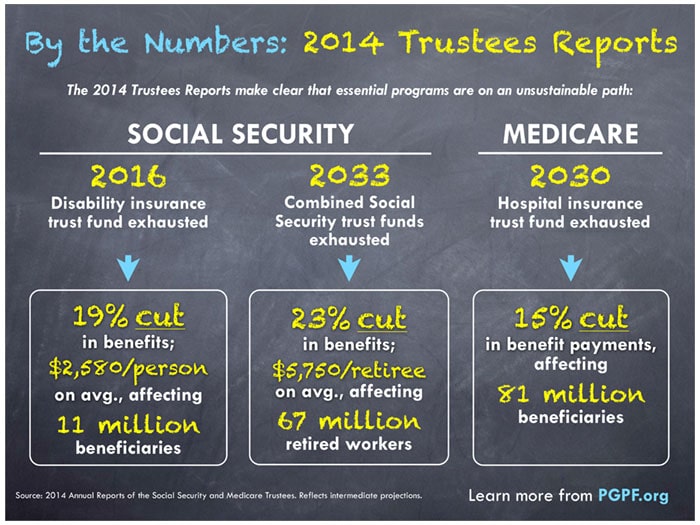Statement on the 2014 Social Security & Medicare Trustees Reports

NEW YORK — Michael A. Peterson, President and COO of the Peter G. Peterson Foundation, commented today following the release of the 2014 Annual Reports of the Social Security and Medicare Trustees:
“Social Security and Medicare are indispensable programs for millions of Americans, especially the most vulnerable in our country. Unfortunately, today’s Trustees reports again make clear that Social Security and Medicare are at risk. We must strengthen these programs for the long term.
“According to the trustees, Social Security recipients will face an automatic cut of 23% to their benefits in 2033 — just 19 years from now. The outlook is even more dire for the Disability Insurance Trust Fund, which is expected to run dry in two years, by the end of 2016. And despite the recent slowing in healthcare cost growth, the Medicare Hospital Insurance Trust Fund will be unable to pay full benefits by 2030, affecting 81 million beneficiaries.
“The good news is that there is still time to act. A gradually implemented fiscal plan that secures the future of Social Security and Medicare and stabilizes the long-term debt would not only make these vital programs sustainable, but would provide an immediate boost in confidence to the economy.
“The math is simple and the consequences of inaction are clear. Delaying action just narrows our options and makes the required reforms more difficult. A comprehensive, bipartisan plan to address our long-term fiscal challenges is the best way to secure our economic future and protect these programs for those who need them most.”
The Peterson Foundation also released the below graphic, By the Numbers: 2014 Trustees Reports.
To link to this graphic, click here.
Further Reading
Budget Basics: What Is the Child Tax Credit?
The CTC provides assistance to families with children, and while it represents a relatively modest part of overall government spending, it is one of the largest tax expenditures.
Budget Basics: Tax Expenditures
Tax expenditures can come in the form of exclusions, exemptions, deductions, and credits.
What Are the Economic Costs of Child Poverty?
Child poverty is higher in the United States than in other wealthy countries. Studies show that it has quantifiable economic costs.



